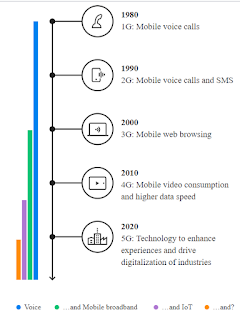"Everything you need to know about 5G"
Here is where you find 5G technology explained—how 5G works, why 5G is important and how it’s changing the way the world connects and communicates. At Qualcomm, we invented the foundational breakthroughs that make 5G possible.
Q: What is 5G?
5G is the 5th
generation mobile network. It is a new global wireless standard after 1G, 2G,
3G, and 4G networks. 5G enables a new kind of network that is designed to
connect virtually everyone and everything together including machines, objects,
and devices.
5G wireless technology is meant
to deliver higher multi-Gbps peak data speeds, ultra low
latency, more reliability, massive network capacity, increased
availability, and a more uniform user experience to more users. Higher
performance and improved efficiency empower new user experiences and connects
new industries.
Q: What is 5G capable of?
5G
will do much more than significantly improve your
network connection. It provides new opportunities, enabling us to deliver
groundbreaking solutions that reach across society. Imagine billions of
connected devices gathering and sharing information in real time to reduce road
accidents; or life-saving applications that can take flight thanks to lag-free
guaranteed connections; or production lines so predictive they can prevent
interruptions well before they occur. There’s no need to imagine. We are making
it happen.
Q: What are the differences between the previous generations of mobile networks and 5G?
The previous generations of mobile networks are 1G, 2G,
3G, and 4G.
First generation - 1G
1980s: 1G delivered analog voice.
Second generation - 2G
Early 1990s: 2G introduced digital voice (e.g. CDMA-
Code Division Multiple Access).
Third generation - 3G
Early 2000s: 3G brought mobile data (e.g. CDMA2000).
Fourth generation - 4G LTE
2010s: 4G LTE ushered in the era of mobile broadband.
1G, 2G, 3G,
and 4G all led to 5G, which is designed to provide more connectivity than was
ever available before.
5G is a unified,
more capable air interface. It has been designed with an extended capacity to
enable next-generation user experiences, empower new deployment models and
deliver new services.
With high speeds, superior reliability and negligible
latency, 5G will expand the mobile ecosystem into new realms. 5G will impact
every industry, making safer transportation, remote healthcare, precision
agriculture, digitized logistics and
more a reality.
Q: How do
consumers use 5G?
The average
consumer is expected to go from being able to consume 2.3 GB of data per month
today to close to 11 GB of data per month on their smartphone in 2022.2 This is driven by explosive growth in
video traffic as mobile is increasingly becoming the source of media and
entertainment, as well as the massive growth in always-connected cloud
computing and experiences.
4G completely
changed how we consume information. In the past decade we have witnessed leaps
and bounds in the mobile app industry around services such as video streaming,
ride sharing, food delivery and more.
5G will
expand the mobile ecosystem to new industries. This will contribute to
cutting-edge user experiences such as boundless extreme reality (XR), seamless
IoT capabilities, new enterprise applications, local interactive content and
instant cloud access, to name a few.
Q:
How fast is 5G?
5G is
designed to deliver peak data rates up to 20 Gbps based on IMT-2020
requirements. Qualcomm Technologies’ flagship 5G solutions, the Qualcomm®
Snapdragon™ X55 and Snapdragon X60 Modem-RF Systems, are designed to achieve up to 7.5 Gbps in
downlink peak data rates.
But 5G is
about more than just how fast it is. In addition to higher peak data rates, 5G
is designed to provide much more network capacity by expanding into new
spectrum, such as mmWave.
5G can also
deliver much lower latency for a more immediate response and can provide an
overall more uniform user experience so that the data rates stay consistently
high—even when users are moving around. And the new 5G NR mobile network is
backed up by a Gigabit LTE coverage foundation, which can provide ubiquitous
Gigabit-class connectivity.
Q: Is 5G available now?
Yes, 5G is already here today, and global operators started launching new
5G networks in early 2019. In 2020, many countries expect nationwide 5G mobile
networks. Also, all major Android phone manufacturers are commercializing 5G
phones. And soon, even more people may be able to access 5G.
5G has been deployed in 35+
countries and counting. We are seeing much faster rollout and adoption compared
with 4G. Consumers are very excited about the high speeds and low latencies.
But 5G goes beyond these benefits by also providing the capability for
mission-critical services, enhanced mobile broadband and massive IoT. While it
is hard to predict when everyone will have access to 5G, we are seeing great
momentum of 5G launches in its first year and we expect more countries to
launch their 5G networks in 2020 and beyond





Comments
Post a Comment